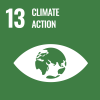Río Chiquito, 16 November 2023 – Dunia, Gloria and Merly know all too well the effects of climate change. They and their families lost everything in Omoa, northern Honduras, when tropical storms Eta and Iota battered the Central American country in November 2020. The cyclones had just been downgraded from hurricane status, but they still wreaked havoc in the country.
"I heard on the radio that a storm was coming and that it was going to rain. But we couldn’t imagine that by 4:00 in the afternoon we would have nowhere to live," says Merly, who was six months pregnant when the storms struck. "I was left crying, everything I had was washed away by the river."

Eta and Iota have been the most severe natural phenomenon to strike Honduras in over 20 years, leaving in their wake floods, damage, and increased vulnerability in the local population. Photo: IOM/Ismael Cruceta
Since the beginning of the century, Honduras and its neighbouring countries have been increasingly affected by multiple climate-related disasters that lead its already vulnerable population to face new challenges.
The long-term Global Climate Risk Index by the NGO Germanwatch reveals that Honduras was the second most affected country worldwide by climate change in the period 1998-2017.

Amid the consequences of the floods, Dunia, Gloria and Merly have become a big family, showing resilience despite having lost everything. Photo: IOM/Sonia Lagos
According to the Economic Commission for Latin America and the Caribbean (ECLAC), around 437,000 people in Honduras were affected by these two storms, 55 per cent of them in the northern region. In the department of Cortés alone, more than half of the population was evacuated and 54 per cent of the country's sheltered persons were concentrated there.
The International Organization for Migration (IOM), in coordination with other actors of the Humanitarian Network of Honduras, focused its efforts on ensuring adequate assistance and protection to people affected by climate change, including people displaced because of environmental factors.

Living with her family in a shelter is a struggle for people like Dunia. Given this, IOM teams have provided constant humanitarian support. Photo: IOM/Sonia Lagos
"I worked in the fields, cutting chili peppers or doing whatever work I had to do to get by. I have beautiful memories of that stage of my life, I visited my mother in the afternoons and was happy with my family," she says in tears.
The storms forced Merly and her three daughters to move to the communal shelter in Río Chiquito, where she met Dunia.
Dunia, on the other hand, is originally from Copán Ruinas, in western Honduras, and moved to Omoa when she was 12. She had never witnessed a tropical storm like those of 2020. Like Merly, her life was tranquil, she had a job, and was able to support her family.
"On weekends we would go swimming with my children in the river, it was beautiful, with clean water, and we never imagined it would overflow and take everything away from us," Dunia says.

IOM supports the rehabilitation of shelters by managing dignified accommodation for those displaced due to the floods. Photo: IOM/Sonia Lagos
Her home was more than 300 metres away from the river's edge and yet it broke in two. The river had a dam to prevent flooding, but in the face of the force of nature, the unimaginable happened.
"We have learned many things at the shelter; we consider ourselves as a family," she says. "Those storms marked us, we never thought we were going to be homeless. It's sad not to have a place to live, but now everything has changed."

Gloria walks with her daughters outside the shelter. Despite the destruction they caused, the floods also revealed the strength and determination of people to rebuild their lives and communities. Photo: IOM/Sonia Lagos
IOM has assisted these three and many other families with shelter and housing facilities in the wake of the disaster, paying their rent before they are being given their own home, thanks to the Honduran NGO, CEPUDO.
This has allowed hope and joy to return to these women, as well as the dignity of a place to live and start over.
"For three years we have struggled, but we have succeeded, and we are very happy that we will finally have our house. This has not been easy, but we will be able to fulfill our dreams," says Dunia.

After several months, families affected by the storms will receive a new home. Photo: IOM/Sonia Lagos
Adverse effects of climate change, disasters, and environmental degradation are reshaping migration patterns worldwide. Climate change is now a leading cause of human mobility. In the framework of the United Nations Climate Change Conference (COP28) in Dubai, IOM calls for concrete actions to avoid, minimize and address the adverse impacts of climate change on the most affected communities.
Text by Ismael Cruceta, Marcela Díaz and Sonia Lagos, Communication and Public Information Unit, IOM Honduras



